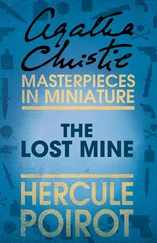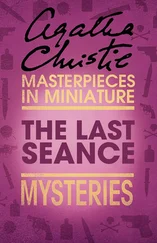‘“I arrive, do I not? You see? All the world is before me.”
‘But as I left the room, I heard her cough, a sharp dry cough. I knew what it meant, that cough. It was the legacy of her consumptive mother.
‘I saw her next two years later. She had gone for refuge to Miss Slater. Her career had broken down. She was in a state of advanced consumption for which the doctors said nothing could be done.
‘Ah! I shall never forget her as I saw her then! She was lying in a kind of shelter in the garden. She was kept out-doors night and day. Her cheeks were hollow and flushed, her eyes bright and feverish and she coughed repeatedly.
‘She greeted me with a kind of desperation that startled me.
‘“It is good to see you, Raoul. You know what they say—that I may not get well? They say it behind my back, you understand. To me they are soothing and consolatory. But it is not true, Raoul, it is not true! I shall not permit myself to die. Die? With beautiful life stretching in front of me? It is the will to live that matters. All the great doctors say that nowadays. I am not one of the feeble ones who let go. Already I feel myself infinitely better—infinitely better, do you hear?”
‘She raised herself on her elbow to drive her words home, then fell back, attacked by a fit of coughing that racked her thin body.
‘“The cough—it is nothing,” she gasped. “And haemorrhages do not frighten me. I shall surprise the doctors. It is the will that counts. Remember, Raoul, I am going to live.”
‘It was pitiful, you understand, pitiful.
‘Just then, Felicie Bault came out with a tray. A glass of hot milk. She gave it to Annette and watched her drink it with an expression that I could not fathom. There was a kind of smug satisfaction in it.
‘Annette too caught the look. She flung the glass down angrily, so that it smashed to bits.
‘“You see her? That is how she always looks at me. She is glad I am going to die! Yes, she gloats over it. She who is well and strong. Look at her, never a day’s illness, that one! And all for nothing. What good is that great carcass of hers to her? What can she make of it?”
‘Felicie stooped and picked up the broken fragments of glass.
‘“I do not mind what she says,” she observed in a sing-song voice. “What does it matter? I am a respectable girl, I am. As for her. She will be knowing the fires of Purgatory before very long. I am a Christian, I say nothing.”
‘“You hate me, cried Annette. “You have always hated me. Ah! but I can charm you, all the same. I can make you do what I want. See now, if I ask you to, you would go down on your knees before me now on the grass.”
‘“You are absurd,” said Felicie uneasily.
‘“But, yes, you will do it. You will. To please me. Down on your knees. I ask it of you, I, Annette. Down on your knees, Felicie.”
‘Whether it was the wonderful pleading in the voice, or some deeper motive, Felicie obeyed. She sank slowly to her knees, her arms spread wide, her face vacant and stupid.
‘Annette flung her head back and laughed—peal upon peal of laughter.
‘“Look at her, with her stupid face! How ridiculous she looks. You can get up now, Felicie, thank you! It is of no use to scowl at me. I am your mistress. You have to do what I say.”
‘She lay back on her pillows exhausted. Felicie picked up the tray and moved slowly away. Once she looked back over her shoulder, and the smouldering resentment in her eyes startled me.
‘I was not there when Annette died. But it was terrible, it seems. She clung to life. She fought against death like a madwoman. Again and again she gasped out: “I will not die—do you hear me? I will not die. I will live—live—”
‘Miss Slater told me all this when I came to see her six months later.
‘“My poor Raoul,” she said kindly. “You loved her, did you not?”
‘“Always—always. But of what use could I be to her? Let us not talk of it. She is dead—she so brilliant, so full of burning life …”
‘Miss Slater was a sympathetic woman. She went on to talk of other things. She was very worried about Felicie, so she told me. The girl had had a queer sort of nervous breakdown, and ever since she had been very strange in manner.
‘“You know,” said Miss Slater, after a momentary hesitation, “that she is learning the piano?”
‘I did not know it, and was very much surprised to hear it. Felicie—learning the piano! I would have declared the girl would not know one note from another.
‘“She has talent, they say,” continued Miss Slater. “I can’t understand it. I have always put her down as—well, Raoul, you know yourself, she was always a stupid girl.”
‘I nodded.
‘“She is so strange in her manner sometimes—I really don’t know what to make of it.”
‘A few minutes later I entered the Salle de Lecture. Felicie was playing the piano. She was playing the air that I had heard Annette sing in Paris. You understand, Messieurs, it gave me quite a turn. And then, hearing me, she broke off suddenly and looked round at me, her eyes full of mockery and intelligence. For a moment I thought—Well, I will not tell you what I thought.
‘“ Tiens !” she said. “So it is you— Monsieur Raoul.”
‘I cannot describe the way she said it. To Annette I had never ceased to be Raoul. But Felicie, since we had met as grown-ups, always addressed me as Monsieur Raoul. But the way she said it now was different—as though the Monsieur , slightly stressed, was somehow very amusing.
‘“Why, Felicie,” I stammered. “You look quite different today.”
‘“Do I?” she said reflectively. “It is odd, that. But do not be so solemn, Raoul—decidedly I shall call you Raoul—did we not play together as children?—Life was made for laughter. Let us talk of the poor Annette—she who is dead and buried. Is she in Purgatory, I wonder, or where?”
‘And she hummed a snatch of song—untunefully enough, but the words caught my attention.
‘“Felicie,” I cried. “You speak Italian?”
‘“Why not, Raoul? I am not as stupid as I pretend to be, perhaps.” She laughed at my mystification.
‘“I don’t understand—” I began.
‘“But I will tell you. I am a very fine actress, though no one suspects it. I can play many parts—and play them very well.”
‘She laughed again and ran quickly out of the room before I could stop her.
‘I saw her again before I left. She was asleep in an armchair. She was snoring heavily. I stood and watched her, fascinated, yet repelled. Suddenly she woke with a start. Her eyes, dull and lifeless, met mine.
‘“Monsieur Raoul,” she muttered mechanically.
‘“Yes, Felicie, I am going now. Will you play to me again before I go?”
‘“I? Play? You are laughing at me, Monsieur Raoul.”
‘“Don’t you remember playing to me this morning?”
‘She shook her head.
‘“I play? How can a poor girl like me play?”
‘She paused for a minute as though in thought, then beckoned me nearer.
‘“Monsieur Raoul, there are strange things going on in this house! They play tricks upon you. They alter the clocks. Yes, yes, I know what I am saying. And it is all her doing.”
‘“Whose doing?” I asked, startled.
‘“That Annette’s. That wicked one’s. When she was alive she always tormented me. Now that she is dead, she comes back from the dead to torment me.”
‘I stared at Felicie. I could see now that she was in an extremity of terror, her eyes staring from her head.
‘“She is bad, that one. She is bad, I tell you. She would take the bread from your mouth, the clothes from your back, the soul from your body …”
Читать дальше












